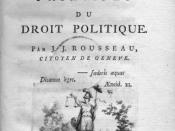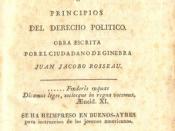Philosophers often attempt to design a societal system that reflects their view of "what is good." However, before this can be established, it is crucial for them to set out, in their opinion, their respective present view of society. In this case, what is commonly held as "good" is freedom. Rousseau's explanation of social contracts affirms his belief in a common will that derives from his concept that if all individuals freely enter into a social contract based on the general will, this establishes authority in the political sovereign as long as it reflects such a will. This "general will" is contrasted with Mill's notion of the liberty principle. The work of Mill "On Liberty" is fundamental to understanding the ways in which to liberate oneself from an oppressive society by way of promoting his harm principle, freedom of opinion and speech, and protection from the majority if one is indeed able to step back and observe the sovereign mechanism of society.
While both philosophers offer valid arguments for legitimate functionality of their respective systems, it will be made evident that Rousseau's insights are tainted with problematic contradictions, and that Mill's structure is one that represents freedom in the truest sense.
Rousseau introduces his notion of the "general will." The general will is a concept in political philosophy referring to the desire or interest of a people as a whole. This notion was first introduced in his work, The Social Contract: an analysis of the contractual relationships that may be necessary in order to establish legitimate government. Rousseau argues that civil society is based on a contractual arrangement of rights and duties which applies equally to all people, whereby natural liberty is exchanged for civil liberty, and natural rights are exchanged for legal rights. The terms of...


